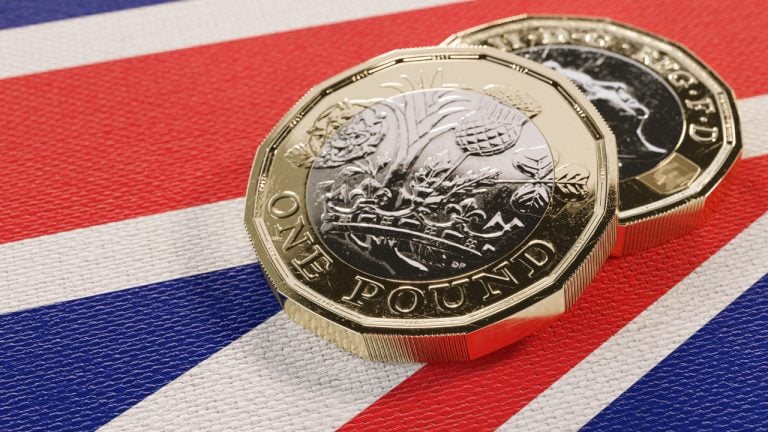 After the British pound sterling tapped an all-time low against the U.S. dollar on September 26, the Bank of England (BOE) said it would halt its monetary tightening policy and start buying long-dated bonds again. Approximately two weeks later, the BOE detailed on Monday that it was doubling the size of its debt buy-backs by […]
After the British pound sterling tapped an all-time low against the U.S. dollar on September 26, the Bank of England (BOE) said it would halt its monetary tightening policy and start buying long-dated bonds again. Approximately two weeks later, the BOE detailed on Monday that it was doubling the size of its debt buy-backs by […]
Investors avoid risk assets during a crisis, but excessive cash sitting in financial institutions could also be good for the cryptocurrencies.
The U.S. Federal Reserve (FED) recently initiated an attempt to reduce its $8.9 trillion balance sheet by halting billions of dollars worth of treasuries and bond purchases. The measures were implemented in June 2022 and coincided with the total crypto market capitalization falling below $1.2 trillion, the lowest level seen since January 2021.
A similar movement happened to the Russell 2000, which reached 1,650 points on June 16, levels unseen since November 2020. Since this drop, the index has gained 16.5%, while the total crypto market capitalization has not been able to reclaim the $1.2 trillion level.
This apparent disconnection between crypto and stock markets has caused investors to question whether the Federal Reserve’s growing balance sheet could lead to a longer than expected crypto winter.
To subdue the economic downturn caused by restrictive government-imposed measures during the Covid-19 pandemic, the Federal Reserve added $4.7 trillion to bonds and mortgage-backed securities from January 2020 to February 2022.
The unexpected result of these efforts was 40-year high inflation and in June, U.S. consumer prices jumped by 9.1% versus 2021. On July 13, President Joe Biden said that the June inflation data was "unacceptably high." Furthermore, Federal Reserve chair Jerome Powell stated on July 27:
“It is essential that we bring inflation down to our 2 percent goal if we are to have a sustained period of strong labor market conditions that benefit all.”
That is the core reason the central bank is withdrawing its stimulus activities at an unprecedented speed.
A "repurchase agreement," or repo, is a short-term transaction with a repurchase guarantee. Similar to a collateralized loan, a borrower sells securities in exchange for an overnight funding rate under this contractual arrangement.
In a "reverse repo," market participants lend cash to the U.S. Federal Reserve in exchange for U.S. Treasuries and agency-backed securities. The lending side comprises hedge funds, financial institutions and pension funds.
If these money managers are unwilling to allocate capital to lending products or even offer credit to their counterparties, then having so much cash at disposal is not inherently positive because they must provide returns to depositors.

On July 29, the Federal Reserve's Overnight Reverse Repo Facility hit $2.3 trillion, nearing its all-time high. However, holding this much cash in short-term fixed income assets will cause investors to bleed in the long term considering the current high inflation. One thing that is possible is that this excessive liquidity will eventually move into risk markets and assets.
While the record-high demand for parking cash might signal a lack of trust in counterparty credit or even a sluggish economy, for risk assets, there is the possibility of increased inflow.
Sure, if one thinks the economy will tank, cryptocurrencies and volatile assets are the last places on earth to seek shelter. However, at some point, these investors will not take further losses by relying on short-term debt instruments that do not cover inflation.
Think of the Reverse Repo as a "safety tax," a loss someone is willing to incur for the lowest risk possible — the Federal Reserve. At some point, investors will either regain confidence in the economy, which positively impacts risk assets or they will no longer accept returns below the inflation level.
In short, all this cash is waiting on the sidelines for an entry point, whether real estate, bonds, equities, currencies, commodities or crypto. Unless runaway inflation magically goes away, a portion of this $2.3 trillion will eventually flow to other assets.
The views and opinions expressed here are solely those of the author and do not necessarily reflect the views of Cointelegraph. Every investment and trading move involves risk. You should conduct your own research when making a decision.

Goldman Sachs reportedly traded digitized treasury bonds for JPM Coin on JPMorgan Chase's Onyx blockchain platform.
After six months of eyeing JPMorgan Chase’s custom blockchain service for repo markets, Goldman Sachs has started trading on the platform.
Mathew McDermott, global head of digital assets for Goldman Sachs’ global markets division, confirmed the first transaction dated June 17 in an interview, Bloomberg reported.
In the trade, Goldman Sachs swapped a tokenized version of a United States Treasury bond for JPM Coin, JPMorgan’s dollar-pegged stablecoin. JPMorgan started its private blockchain service to drive efficiency in repo agreements last year. The platform uses JPM Coin to swap digitized United States Treasury bonds.
Goldman Sachs was one of the first financial institutions to notice the platform. Last year, McDermott mentioned the efficiency of JPMorgan’s blockchain-based repo-market service, saying that “enterprise blockchain can address a real-world problem in the financial system.”
As a trillion-dollar market, repurchase or “repo” agreements are short-term lending arrangements for dealers in government bonds. An overnight repo allows dealers to sell government bonds to investors and repurchase them the next day at a slightly higher price.
Related: Goldman Sachs to offer Bitcoin futures trading
Calling the trade a pivotal moment for the digitization of transactional activity, McDermott highlighted that, unlike the traditional repo market, the precise timing of the transaction could be logged thanks to blockchain technology.
Smart contracts on the blockchain enable the collateral and cash to interchange simultaneously and immediately, and this is a big step up for the repo market, according to McDermott:
“We pay interest per the minute. We firmly think this will change the nature of the intraday marketplace.”
JPMorgan Chase first announced the launch of its own stablecoin back in early 2019, with an initial focus on international settlements by major corporations. First trades started in December, and since then, JPM Coin has been embraced by transnational corporations for around-the-clock cross-border payments.
The bank established its version of the Ethereum blockchain, Onyx, which is now processing more than $1 billion worth of transactions daily.

Bitcoin bulls ducked for cover as the Federal Reserve started paying interest rate returns on cash deposits via its reverse repurchase program.
Bitcoin (BTC) suffered as investors moved a record amount of cash in Federal Reserve's overnight facility after the central bank started paying interest on the money.
The U.S. central bank received $756 billion via its reverse repurchase program from nearly 70 market participants on Thursday. The stash is about $172B higher than the one deposited last week and roughly $235B more than on Wednesday, wherein only 53 investors tapped the facility.
A reverse repo facility takes in cash majorly from money-market funds and government-sponsored banks. Until Wednesday, the service offered eligible users a return interest of zero percent.
But after the Federal Reserve signaled faster and sooner interest rate increases — in 2023 instead of previously anticipated 2024, the facility moved its revere repo rate up to 0.05% and interests on excess reserves rates, which banks deposit 0.15% from 0.10%.

Primarily due to quantitative easing for the U.S. economy, excessive dollar liquidity has been pouring into money market funds that later invest this in short-term government securities. Higher demand for those securities has often sent their yields into negative territories.

Negative-yielding securities in response to Fed's quantitative easing turned out to be one of the major bullish catalysts for Bitcoin and other digital assets since March 2020. Against traditional debts, the cryptocurrency sector promised better returns and, in some cases, consistent yields from the emerging decentralized finance industry.
But with Fed throwing a curveball at the markets with its hawkish tones, mainstream investors have been turning to facilities that seem less risky than Bitcoin or gold and promise a decent yield. As a result, the Fed's repo market records its most enormous inbound cash flow.
"We appear to be seeing a growing inversely proportional correlation between the price of Bitcoin and the Reverse Repo market from the Fed," said Petr Kozyakov, co-founder and CEO at crypto wallet service Mercuryo. He added:
"Many investors choose the more volatile Bitcoin as it promises higher returns. However, with the current market trends, some BTC investors are perhaps offloading their positions as the dollar outlook is vital at this point.
The U.S. dollar, also considered a haven against market uncertainties, rose to 92.70 against a basket of top foreign currencies this Friday. That marked the greenback's highest level since mid-April. Bitcoin reacted negatively to a stronger buck.

Raoul Pal, the founder/CEO of Global Macro Investor, said the dollar's climb killed the inflation narrative. Nevertheless, the macroeconomic analyst stressed that the Fed-led tapering woes wouldn't hurt alternative hedging assets like Bitcoin and gold in the long run.
Related: Diversification into Bitcoin a ‘prudent move,’ says Bloomberg strategist
He noted that the U.S. government tends to push through more stimulus packages that expand the Fed balance sheets. That means the central bank keeps buying the sovereign debt, thereby pushing bond yields lower. Pal said:
"My view remains that H2 is weaker than expected and inflation fears subside for now, and growth looks patchy. That results in more stimulus (not tightening) in Q4.

The analyst added that the dollar's recovery trend would stabilize in the second half of 2021. Eventually, the capital would start flowing back into gold and crypto markets.
 Homebuyers in the United States have found difficulties acquiring single-family homes after the year-long business shutdowns and lockdowns that followed Covid-19. It seems there’s a new wave of homebuyers in the U.S. real estate market, with buyers stemming from hedge funds, pension funds, clearinghouses, and financial services companies. The weight of real estate property under […]
Homebuyers in the United States have found difficulties acquiring single-family homes after the year-long business shutdowns and lockdowns that followed Covid-19. It seems there’s a new wave of homebuyers in the U.S. real estate market, with buyers stemming from hedge funds, pension funds, clearinghouses, and financial services companies. The weight of real estate property under […] The Federal Reserve and America’s big banks have significantly inflated home prices across the U.S. according to a number of statistics. In many towns across the nation, home sales are facing bidding wars and certain regions are seeing property shortages. One report notes that homebuyers are bidding against “pension funds and Wall Street types,” as […]
The Federal Reserve and America’s big banks have significantly inflated home prices across the U.S. according to a number of statistics. In many towns across the nation, home sales are facing bidding wars and certain regions are seeing property shortages. One report notes that homebuyers are bidding against “pension funds and Wall Street types,” as […]